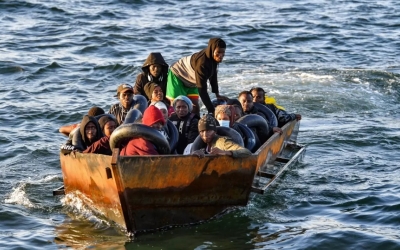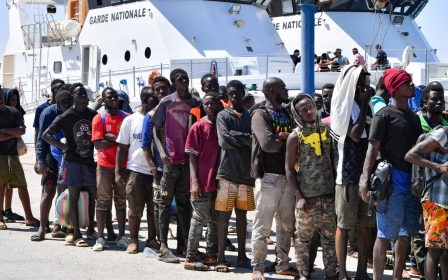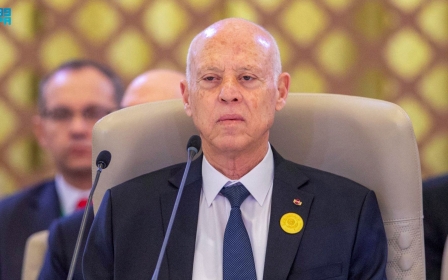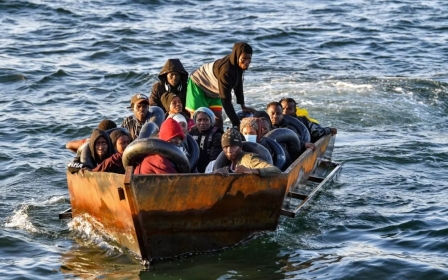EU-Tunisia migrant deal 'terrible for human rights', says HRW
The European Union’s decision to release $135m in migrant control assistance to Tunisia was branded “terrible for human rights” by rights group Human Rights Watch (HRW) on Thursday.
Last week, the European Commission announced the payment, which came after a controversial deal signed with the North African country in July.
The decision by the EU was made “despite an absence of any specific human rights guarantees for migrants and asylum seekers”, said HRW.
Moreover the deal risked making the EU “complicit in abuses” carried out by Tunisian authorities.
The deal came at a time when Sub-Saharan Africans in Tunisia are the target of anti-immigrant rhetoric by government officials.
New MEE newsletter: Jerusalem Dispatch
Sign up to get the latest insights and analysis on Israel-Palestine, alongside Turkey Unpacked and other MEE newsletters
Tunisia's President Kais Saied has previously said there is conspiracy to change the demographic make-up of the country using migrants from elsewhere on the continent.
The “rush to send money” to Tunisia after a significant rise in migrants to the bloc demonstrated the “EU’s obsession with sealing its borders over saving lives”, added HRW.
In giving money to Tunisia, HRW warned that the country’s human rights abuses will not only go “unchallenged” but the migrant issue risked being used to pressure the EU for additional funds.
Increased migrant arrivals
The financial assistance is meant to prop up Tunisia's crisis-hit economy and help the country stop migrants from heading to the EU. More than 10,000 migrants have arrived at the Italian island of Lampedusa in recent weeks.
Italy's right-wing prime minister, Giorgia Meloni, has been pushing the EU to fulfil the agreement that European Commission President Ursula von der Leyen brokered in July.
The EU agreed to pay the first instalment despite Tunisia banning an EU delegation from visiting the country last week.
Mounir Satouri, a French member of the European Parliament's Committee on Foreign Affairs, called the decision a "slap in the face to parliamentary diplomacy".
Speaking to Middle East Eye, Satouri said "this is the first time since 2011 that it has not been possible to simply exchange views, to meet the players in the country's political and associative life".
This year between 1 January and 23 July, more than 84,300 individuals arrived in Italy by sea, a 144 percent increase from the preceding year. Some 66 percent of these arrivals made landfall on Lampedusa, up from the 48 percent recorded during the same period in the previous year.
This surge can be attributed, in part, to the escalating numbers of arrivals from Sfax in Tunisia, which has now surpassed Libya as the principal departure point for refugees embarking on the perilous journey across the central Mediterranean to reach Europe.
Based on data from the United Nations High Commissioner for Refugees, 58 percent of refugee sea crossings in the first three months of 2023 originated from Tunisia.
Migrant abuses
MEE reported earlier this month that Sub-Saharan Africans in Tunisia are increasingly being denied emergency food and water supplies in the government's latest move to crack down on migration at the behest of Saied.
The plight of migrants, mainly from Sub-Saharan countries, is the "worst" in modern Tunisian history, Nicholas Noe, a senior visiting fellow at Refugees International, told MEE.
Earlier this year, HRW reported that the Tunisian police, military, national guard and coastguard have been involved in grave violations against Black African migrants, refugees and asylum seekers.
Beatings, use of excessive force, some cases of torture, arbitrary arrests and detention, collective expulsions, dangerous actions at sea, forced evictions and theft of money and belongings are all examples of abuses documented by HRW.
Middle East Eye delivers independent and unrivalled coverage and analysis of the Middle East, North Africa and beyond. To learn more about republishing this content and the associated fees, please fill out this form. More about MEE can be found here.


